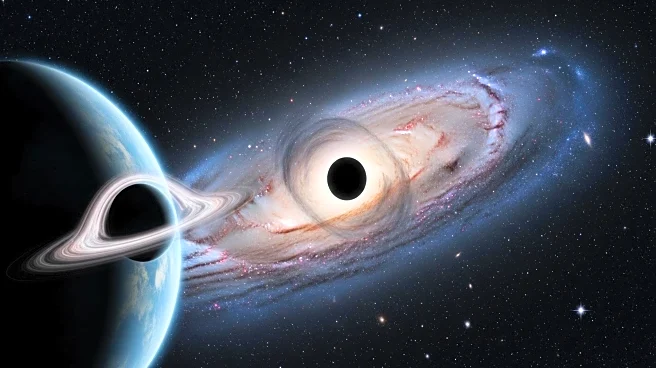What is the story about?
What's Happening?
Astrophysicists Mehrdad Phoroutan-Mehr and Tara Fetherolf from the University of California, Riverside, have proposed a model where dark matter could accumulate in the cores of giant exoplanets, potentially collapsing into tiny black holes. This model suggests that if dark matter particles are heavy enough and do not annihilate, they could form black holes that consume the surrounding planetary material. The study highlights the possibility of detecting planet-mass black holes as evidence of superheavy non-annihilating dark matter. Despite the challenges in detecting such phenomena due to current technological limitations, the researchers believe that future advancements in space observation technology could make it feasible.
Why It's Important?
The study offers a novel approach to understanding dark matter, which constitutes approximately 85% of the universe's matter but remains undetectable directly. By exploring the interaction between dark matter and exoplanets, scientists could gain insights into the nature of dark matter and its properties. This research could potentially lead to breakthroughs in identifying dark matter's obscure features, impacting astrophysics and cosmology. The ability to detect planet-sized black holes would provide strong evidence for the existence of superheavy non-annihilating dark matter, advancing scientific knowledge and possibly influencing future space exploration strategies.
What's Next?
The researchers suggest that exoplanet surveys could be utilized to hunt for superheavy dark matter particles, particularly in regions rich in dark matter like the Milky Way's galactic center. As space observation technology continues to improve, the possibility of detecting planet-mass black holes becomes more plausible. Future instruments may emerge that are sensitive enough to observe these phenomena, potentially validating the proposed dark matter model. Continued data collection and detailed examination of individual planets could offer crucial insights into dark matter's nature, driving further research and exploration in the field.
Beyond the Headlines
The implications of this research extend beyond astrophysics, touching on philosophical and existential questions about the universe's composition and the potential for unknown cosmic phenomena. The study challenges current understanding and encourages a reevaluation of how dark matter interacts with celestial bodies. It also raises ethical considerations regarding the pursuit of knowledge in areas that could fundamentally alter human perception of the universe.














